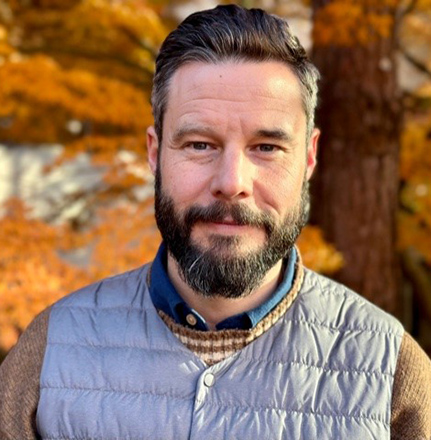 In recognition of his excellence in teaching and his commitment to the principles of equity, inclusion, and decolonization, Dr. William (Will) Valley is the recipient of one of this year's West Coast Teaching Excellence Awards. Through this award, the British Columbia Teaching and Learning Council (BCTLC) celebrates excellence in teaching in publicly funded colleges, institutes, and universities in British Columbia and Yukon.
In recognition of his excellence in teaching and his commitment to the principles of equity, inclusion, and decolonization, Dr. William (Will) Valley is the recipient of one of this year's West Coast Teaching Excellence Awards. Through this award, the British Columbia Teaching and Learning Council (BCTLC) celebrates excellence in teaching in publicly funded colleges, institutes, and universities in British Columbia and Yukon.
"It's an honour to be recognized for my work, but even more so, an honour to be able to support students on their journey through exploring the principles of EDI," says Dr. Valley.
An Associate Professor of Teaching in Applied Biology, Dr. Valley is also the Associate Dean of Equity, Decolonization, and Inclusion in the Faculty of Land and Food Systems at UBC.
"This is challenging work and often it can be emotionally overwhelming, but it is necessary to create a more just and equitable society, and produce future leaders who embrace social justice as a fundamental part of natural sciences and food systems education," continues Dr. Valley.
Dr. Valley teaches in sustainable food systems and critical food systems pedagogy in the Faculty of Land and Food Systems, ranging from first-year to graduate level, and has supervised several graduate and undergraduate students in their research projects and directed studies. His educational leadership focuses on three areas: sustainable food systems education, equity and decolonization, and K-12 food literacy education. He has been involved in various curriculum development, pedagogical innovation, and scholarship of teaching and learning projects related to these areas, collaborating with colleagues from UBC and other institutions across North America.
Dr. Valley is a leader in decolonial, anti-racist, and anti-oppressive approaches, as evidenced in his teaching as well as his grant-funded projects and publications. His focus on food justice and Indigenous food sovereignty in LFS 350 - Land, Food, and Community II - is one example, as part of ensuring students are prepared for partnering with community organizations that work with marginalized populations. In LFS 490 - Facing Human Wrongs" - students work through four forms of denial that keep humanity from effectively addressing complex, wicked problems, including the denial of colonial violence and denial of interdependence. The course seeks to prepare students to address real-world problems in socially and ecologically accountable ways, without sacrificing nuance or minimizing complicity. In Dr. Valley's courses, students learn about food security at different scales, impacts of colonialism, racism, and other inequities, as well as how to recognize and address their own strengths and areas of growth as they work collectively towards a more just future.
Another standout aspect of Dr. Valley's teaching is his emphasis on community engagement as well as knowledge translation and dissemination. In LFS 250 - Land, Food, and Community I, students facilitate food literacy workshops in local K-12 schools; an elementary school teacher notes that the students are extremely well prepared, demonstrating "cultural sensitivity, empathy, and patience, [and] creating a welcoming and inclusive environment." In LFS 350, students work on community-identified issues and present their findings in a public forum based on their term-long collaborations with community partners. Student comments enthusiastically point to how this experience significantly improved both their confidence and skills in communicating their work.
As an instructor, Dr. Valley's goal is to provide a structure through which students feel motivated, challenged, and supported as they develop self-directed learning competencies for a lifetime of curiosity. In his courses, learners construct knowledge and understanding of the world through a process of experience and reflection, reconciling new information and experiences with prior knowledge and understanding. Content knowledge and disciplinary specific skills are accompanied with learning about affect, effective collaboration, communication skills, as well as learning to identify the values embedded in different cultures and others' perspectives and reasoned positions.
Dr. Valley believes that anti-oppression and decolonial pedagogies are essential for undergraduate students in the natural sciences to foster critical awareness of power dynamics, challenge systemic inequalities, and promote inclusivity. These principles guide him in developing learning experiences that equip students with the skills to examine the social implications of scientific research and advocate for equitable and just practices in their fields. Since 2016, Dr. Valley has been increasingly committed to embedding equity, diversity, and inclusion into all aspects of his teaching and integrating a decolonial lens through his work with Indigenous colleagues, students, and communities.
"We are thrilled for Will," says Dr. Rickey Yada, UBC's Dean of Land and Food Systems. "He has created an incredibly unique program and exceptional coursework that impacts both his students and the community-at-large."
The West Coast Teaching Excellence Awards were established by the British Columbia Teaching and Learning Council, a community of public post-secondary leaders with a mission that includes enhancing high-quality teaching and learning cultures in British Columbia and Yukon.